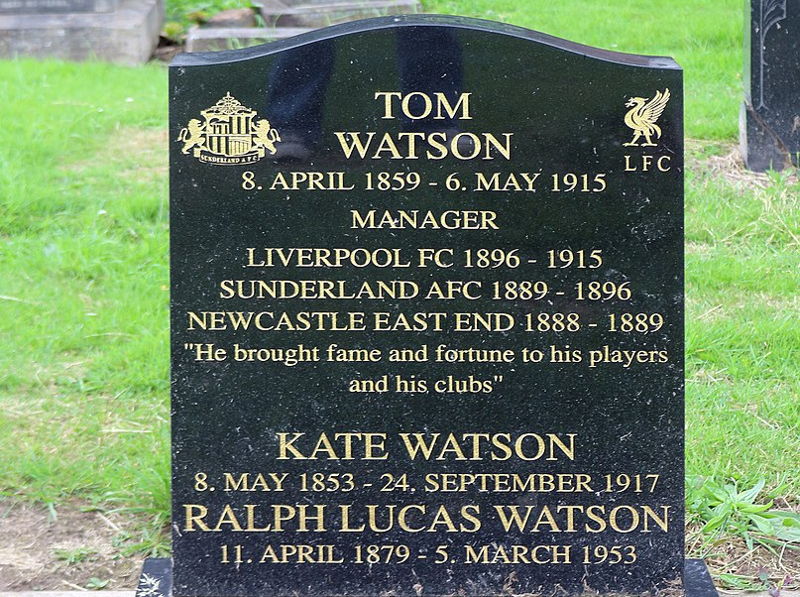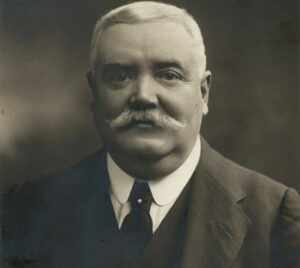
Tom Watson, not to be confused with the one-time Labour MP of the same name, had an undistinguished playing career. He played for Woodbine, Rosewood and Heaton, so hardly set the world alight with his dazzling footballing talent. It is a slightly different story when it comes to his management style, however.
Watson began life as a football manager when he took charge of the Sunderland team for six seasons, beginning in 1889. He guided them to three league titles, making a name for himself as a manager who knew how to win, with his side declared to be a ‘Team of all Talents’ by the founder of the Football League, William McGregor.
It was perhaps his success at Sunderland that caught the eye of those in charge at Liverpool, who were looking for a manager to help them achieve success similar to that that the Black Cats had notched up. He arrived at Anfield in 1896 and went on to become the club’s longest-serving manager, actually dying in the role in 1915.
Most wins as @LFC manager after 250 games in charge (all comps):- JURGEN KLOPP 155, Kenny Dalglish 152, Bob Paisley 140, Gerard Houllier 134, Bill Shankly 133, Tom Watson 110, George Kay 100, George Patterson 94.
— Ged Rea (@ged0407) February 15, 2020
He did indeed manage to repeat the success that he’d achieved at Sunderland, winning the club its first top-flight title in 1901 and then doing so again five years later. It made him the first manager ever to win the League Championship with two different clubs, with Herbert Chapman, Brian Clough and Kenny Dalglish joining him since.
Watson Catches Liverpool’s Eye
 Liverpool had been promoted from the Second Division for the second time in 1896, having existed as a club for just four years at that point. There was a need for them to bring someone in who, it was felt, could transform the club into something that could take the fight to the other sides in the top-flight. It was with this in mind that they turned to Tom Watson, who had made footballing waves in the northeast of England.
Liverpool had been promoted from the Second Division for the second time in 1896, having existed as a club for just four years at that point. There was a need for them to bring someone in who, it was felt, could transform the club into something that could take the fight to the other sides in the top-flight. It was with this in mind that they turned to Tom Watson, who had made footballing waves in the northeast of England.
He had helped clubs from both the east and the west sides of the city of Newcastle, as well as being one of the people that helped to found Newcastle United itself at its ground of St. James’s Park.
It was his work at Sunderland that truly helped Watson to stand out, however. He won back-to-back league titles in 1892 and 1893, taking the Black Cats to three FA Cup semi-finals before adding a third and final league championship in 1895.
He had quickly established himself as one of the most sought-after men in football, putting together a team that wasn’t particularly noteworthy to look at, but which had ‘all of the talents’. Victor Hall wrote of him in the Liverpool Echo in 1924 satin that he had ‘beat, and hammered, and forged to perfection the steel-tempered football machine that was in his day the “irresistible” Sunderland team.’
The Move to Liverpool
By gaining promotion back into the First Division, Liverpool were in a position whereby they could try to show some ambition as the club looked to become more successful than the Everton side that they had replaced at Anfield. The desire to bring Watson to Liverpool as the Club Secretary was so great that they offered to double his salary, making him the highest paid person in that position in the league.
He earned £300 per year, which was a huge sum back in 1896. He soon established himself as more than just a Club Secretary, becoming something of a pioneer of many of the roles that are associated with the manager in the modern game.
A huge figure in the early history of Liverpool FC, Mr. Tom Watson was born today in April 1859 – 160 years ago!
Our first two titles were won in 1901 & 1906… both under his management. A man who deserves his place among the Liverpool Greats. @LFC @Liddellpool @thisisanfield pic.twitter.com/N8uAPAbMl7
— “YNWA” The Story of Liverpool FC (@LFCHistoryShow) April 8, 2019
Indeed, modernisation was a key word for Watson after he took on the job at Anfield. He became involved in the likes of team selection and tactics, whilst also having to take control of players who had grown used to calling the shots at the club.
Watson believed in the importance of the likes of diet and exercise; though it is fair to say that his methods wouldn’t pass muster today. Things were about to change in the Liverpool dressing room, with Watson’s success in the game meaning that he was instantly given success by the players. They were told to report to the club for 7.30am, going on a stroll before being back for an 8.30am breakfast.
Establishing his Methods
Watson was keen for his players to avoid the likes of butter, milk, potatoes and sugar, so they were served weak tea, eggs, chops and dry or stale bread. Training began at 9.45am, with a second session at 3.30pm. When dinner time came around, they were asked to be sparing with their tobacco usage but were allowed a glass of beer or some claret to drink.
The man who steered @LFC to the first of their 19 titles: the Newcastle-born manager Tom Watson who led the Reds to glory in 1901 – and 1906. (He’d also won the title 3x with @SunderlandAFC). He looks like an Edwardian version of Steve Bruce … pic.twitter.com/8c04W7Edjb
— Dan Jackson (@northumbriana) June 25, 2020
The day was drawn to a close with another stroll around the local area at 7.30pm before the players headed for home. Given the fact that association football was still very much in its infancy at the time, it would have required a lot of work for Watson to persuade his players to adjust their routines so much.
It wasn’t just in the training and diet where Watson had a modernising influence. The man himself wrote an article entitled ‘Hunting for Men’, in which he talked of how important recruiting the right players was to his success. He persuaded numerous Scottish players to move south of the border with the families, largely because they were the best footballers of the time rather than because he had a particular preference for working with them.
He depended on Liverpool being willing to pay the money required to put together the best team in the land, whilst the club chaplain was instrumental in persuading parents that the best interests of their sons were at heart.
The Early Years at Liverpool
Tom Watson’s first match in charge of Liverpool was also the first one in which the club played in red shirts and white shorts. Though they would later be changed to an all red kit by Bill Shankly, it was a major change for the side, with the match taking place at Olive Green and seeing the Reds win 2-1 against The Wednesday.
It was a decent start to a campaign that would see Liverpool finish fifth at the end of the season, which wasn’t too shabby considering they’d only just been promoted into the top-flight. The club also matched it with a run to the semi-finals of the FA Cup, defeating the likes of West Bromwich Albion and Nottingham Forest along the way.
Born on this day in 1859…the late great Tom Watson. His 19 years at the Anfield helm (1896-1915) make him the longest-serving manager in @LFC history and he was also one of the finest, guiding the Reds to two league titles and setting the standards for all who followed🏆🏆🔴📕 pic.twitter.com/GE8aL4x5DU
— Old Liverpool FC In Colour (@OldLFC_Colour) April 8, 2023
Eventually Aston Villa knocked Liverpool out thanks to a 3-0 win in a replay that was hosted at Bramall Lane, with the Villans eventually going on to win the trophy. Even so, it was a sign of just how much Liverpool had progressed and how good Watson was at his job. Ahead of the 1897-1898 season, though, five players departed the club and 17 new ones arrived, signalling a change in direction from Watson.
We know that the club spent £1,295 bringing in the new players, with many fees going un-reported to mean that it was probably actually much higher and showed the ambition that the Reds had to win the Football League.
Success Arrives
One of the recruitments that was made by Watson was that of Alex Raisbeck, who arrived in May 1898 and would go on to become the club captain. The side came close to winning its first title in 1899, with Aston Villa defeating them on the final day of the season in order to claim the title. Another semi-final defeat in the FA Cup, this time to Sheffield United after two replays were needed, probably didn’t help the league campaign.
What followed was a slight regression, with the Reds finishing tenth in the 1899-1900 season, but the owners held firm and Watson helped to deliver the club’s first ever title on the 29th April 1901.
(Found on Reddit) Happy birthday to Tom Watson, @LFC‘s first league-winning manager (1901 and 1906), and the first manager to win the league with two clubs (@SunderlandAFC)! pic.twitter.com/27U6jXH17Z
— Kop On! An LFC Podcast (@koponpodcast) April 8, 2019
It made him the first ever person to lead two different football clubs to the English Football League title, but, more importantly, it gave Liverpool the success that the owners had long craved. It led 60,000 people to turn up outside Liverpool Central Station to welcome the newly crowned champions back to the city.
Yet it wasn’t nothing but unbridled success for Watson and his Liverpool team. They were relegated to the Second Division at the end of the 1903-1904 season, leading some to question whether Watson was still the right man. Thankfully none of those people were in the Anfield boardroom, so faith in him was maintained.
Another League Title & Watson’s Death
Watson led Liverpool back into the First Division at the first time of asking, following up the promotion with another league title in 1906. It meant that his stock as a manager couldn’t really have been higher, yet somehow it went up. That is thanks to the fact that he got the Reds into the FA Cup final in 1914, taking the club’s status into the elite level.
The final was played at Crystal Palace and, sadly, Burnley ran out as the 1-0 winners, with the match having taken place in front of the King. Remarkably, it would take more than 50 years for Liverpool to win the FA Cup for the first time, showing how big an achievement even reaching the final had been.
Come across this today in anfield cemetery, the resting place of Tom Watson, @LFC and @SunderlandAFC manager. He led both clubs to their first League titles. YNWA #LFC pic.twitter.com/dE965Tm5Wh
— John Rietdyk (@AnfieldJR) February 11, 2021
Whether Watson had plans for another evolution of life at Anfield we will never know. In 1915, he suffered from a short illness before succumbing to pneumonia at his home, just a short walk from Anfield. He was just 56 at the time of his death and, having been involved in club business just a few days before his passing, it would undoubtedly have been a shock to everyone at the club.
A pioneer of football, he helped Liverpool to win the First Division title for the first time, followed it up with another, won the Second Division and also the Lancashire League. Had he won the FA Cup, he’d have made a case for being one of our best-ever managers.
Tom Watson Honours List
By the time Tom Watson died, he had been in charge of Liverpool for 19 years. During the time, he had picked the team for 742 games, ending his time in charge with 329 wins, 272 losses and 141 draws. That resulted in a win percentage of 44.34%. With Watson in the hot-seat, Liverpool were either challenging for the title or battling relegation, with very little in between.
Here is a look at what he won during his career with both Sunderland and Liverpool:
- Football League First Division: 1891-1892, 1892-1893, 1894-1895, 1900-1901, 1905-1906
- Football League Second Division: 1904-1905



